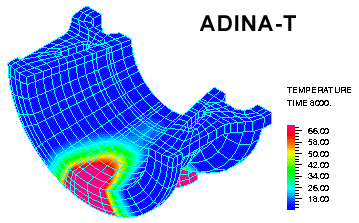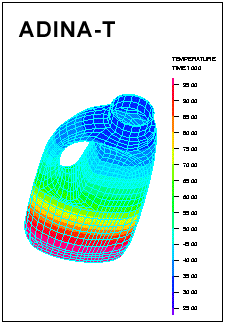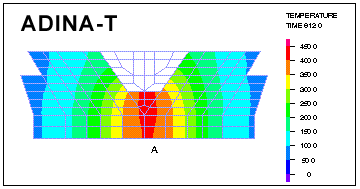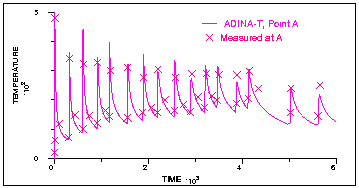|
| |

The ADINA-T program
is used for the solution of heat transfer problems in solids and structures.
It has powerful features such as radiation between surfaces of
arbitrary geometries, element birth-death options and
capabilities for highly nonlinear material behavior.

Temperature field of turbine casing, convection boundary conditions.
ADINA-T's analysis capabilities include:
|
|
2-D & 3-D conduction, convection and radiation.
|
|
|
Solids and shell structures.
|
|
|
Steady-state and transient conditions.
|
|
|
Radiation between arbitrary surfaces.
|
|
|
Element birth and death options.
|
|
|
|
Time and temperature-dependent material properties.
|
|
|
Automatic time stepping.
|
|
|
Electrostatic, seepage and piezo-electric analysis.
|
|
|
Latent heat effects, e.g., freezing and melting conditions.
|
|
|
Coupling to ADINA.
|
|
A unique capability of ADINA-T is the analysis of radiation between surfaces.
The surfaces can have arbitrary geometries, can be arbitrarily obstructed and
radiate upon themselves.
The bottle in this figure was analyzed using this radiation capability. |

Heat transfer analysis of a bottle
modeled using shell elements.
|

Thermal analysis for SAW (Submerged Arc Welding), multipass butt weldment.
|
Welding-induced residual stress analysis requires a reliable nonlinear analysis
system with specialized modeling techniques. ADINA-T and ADINA are being used
successfully in welding analysis. |
The finite element calculation was performed using the birth/death options of
the elements, with material properties highly dependent on temperature.
The solution was obtained using 3 restart runs and 1,500 time steps. |

|
Back to Top
|
![]()